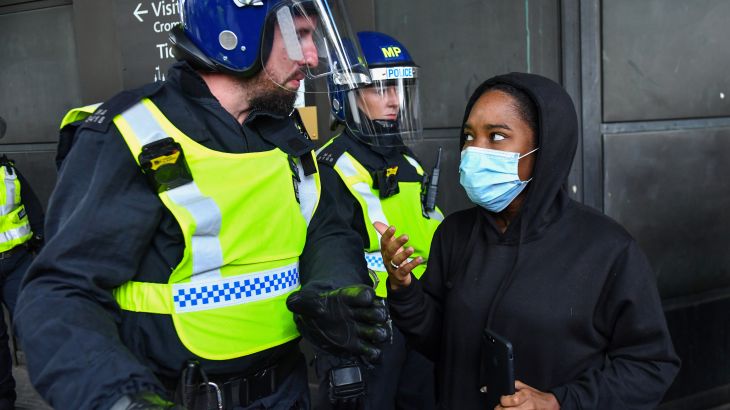
Can the UK stamp out racism in its policing?
On Thursday, July 22 at 19:30 GMT:
A string of arrests by police of people who allegedly racially abused Black players in the England national football team has highlighted the ugly extent of everyday racism in the United Kingdom. But with institutional racism in the UK also a persistent problem, police forces themselves are being challenged to address racially discriminatory practices.
A recent report by a watchdog that assesses policing in England, Wales and Northern Ireland found that police are still disproportionately using their powers against Black, Asian and minority ethnic (BAME) individuals. The HM Inspectorate of Constabulary and Fire & Rescue Services found that Black individuals are 5.7 times more likely to have force used against them by police, compared to white people.
The report also says that Black people are almost nine times more likely to be stopped and searched by police than white people – more than 35 years after stop and search powers were introduced – and that “no police force can satisfactorily explain why”. Between March and May 2020 young Black men in London were stopped nearly 22,000 times by police, about a quarter of all people within that demographic in the England capital. About two-thirds of minority ethnic people surveyed by Hope Not Hate in 2020 feel the police are biased against them. In one major case, justice campaigners want greater scrutiny into how Dyfed-Powys police handled an incident where Siyanda Mngaza alleged she had been racially attacked – but was instead the only person arrested. She was later charged and imprisoned.
The HM Inspector of Constabulary Wendy Williams says racial disproportionality in policing may pull more Black and ethnic minority individuals into the criminal justice system, in turn hampering their education and work prospects and hurting families. But Home Secretary Priti Patel continues to defend stop and search. In May she said families of those affected by violent crime “want more stop and search”, and she is sponsoring a bill that would expand police powers.
Rights groups are among those warning that the proposed legislation “will only increase racial disparities” in policing. Meanwhile, Black and minority officers have reported racism at work that ultimately undermines efforts to build a service more representative of the wider public.
Racial justice advocates say discrimination by police against Black and minority ethnic people often escalates into physical harm that costs lives. On July 13 an inquest heard that Mouayed Bashir died in hospital after he was restrained by police in Newport, South Wales. His death came five weeks after hundreds of people marched through the Welsh capital Cardiff to demand accountability for the death of Mohamud Mohammed Hassan soon after he was released from police custody with severe injuries. Six South Wales Police officers have so far been served misconduct notices by a police watchdog.
In this episode of The Stream, we’ll look at how police forces in the UK disproportionately target Black, Asian and minority ethnic communities, and what reforms are needed to end racial disparities in policing.
In this episode of The Stream, we’ll be joined by:
Leroy Logan, @LeroyLogan999
Former Superintendent, Metropolitan Police and Author ‘Closing Ranks: My Life as a Cop’
leroylogan.com
Cammilla Mngaza
Mother of Camilla Mngaza
freesiyanda.com
Sal Naseem, @policeconduct
Regional Director for London, Independent Office for Police Conduct